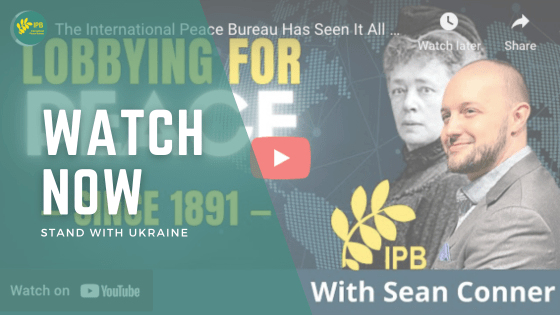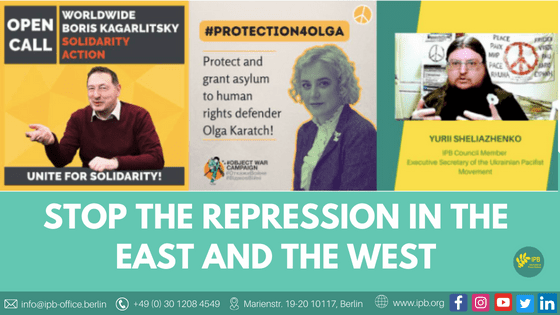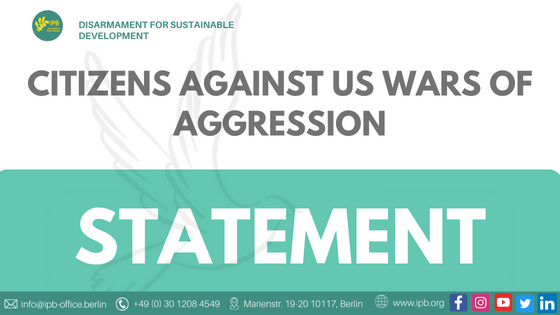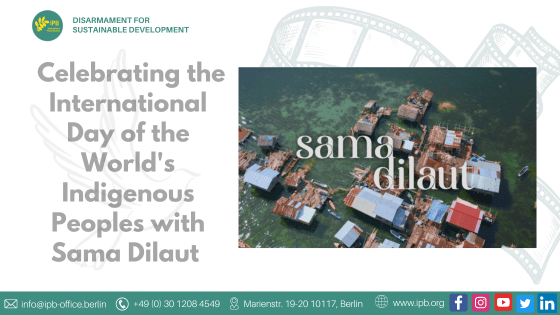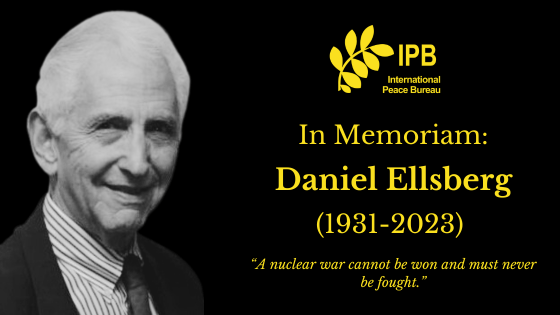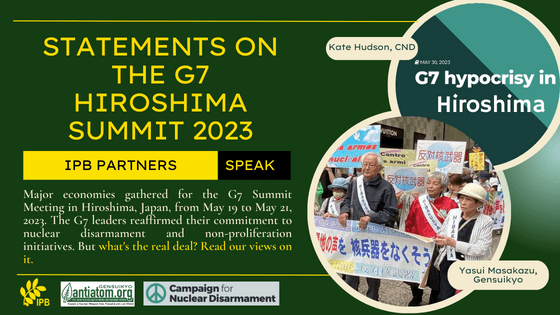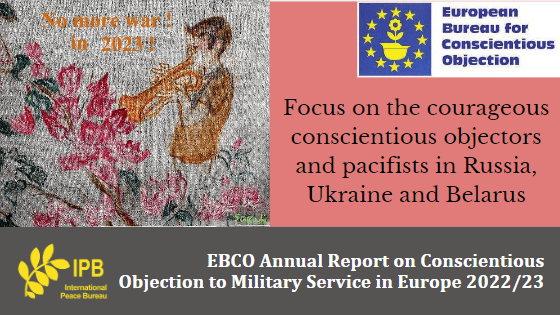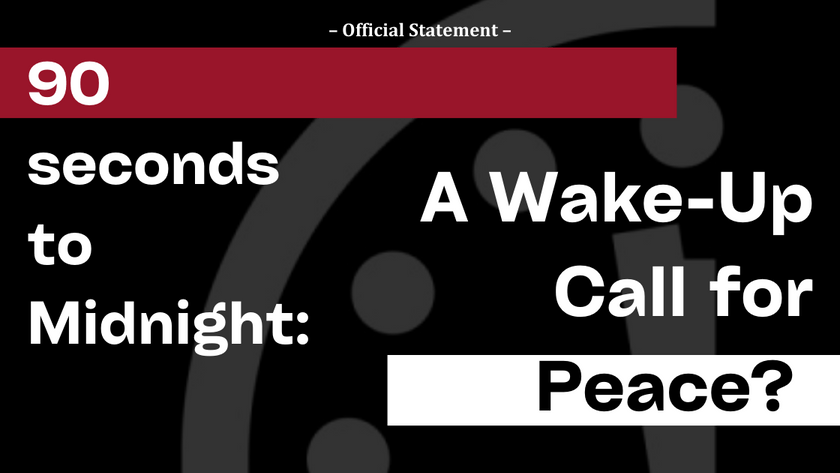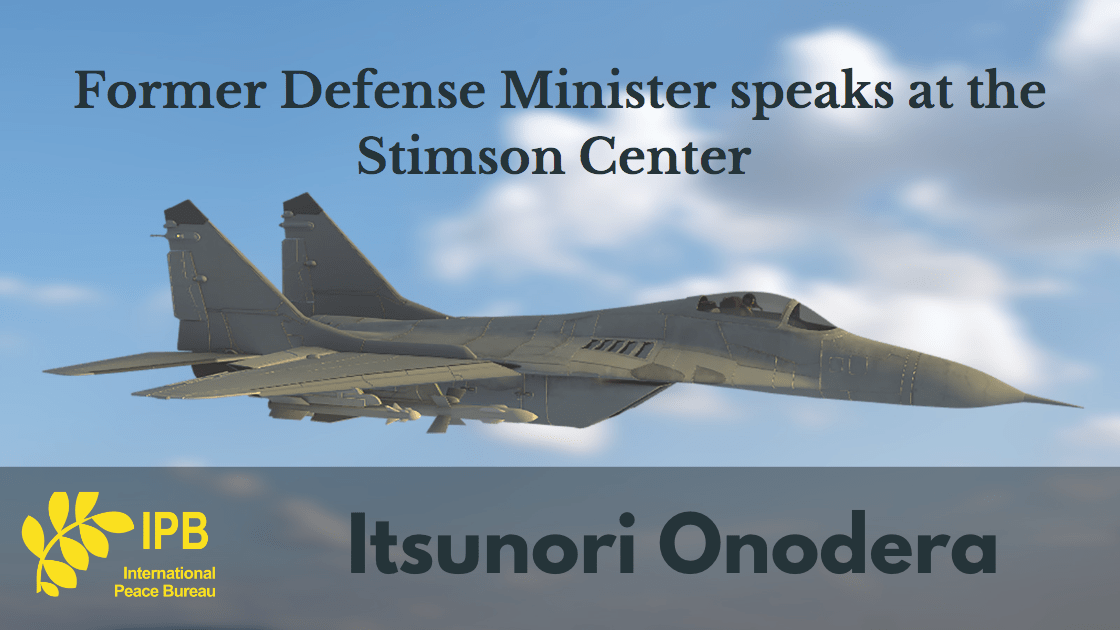Meet Sean Conner, the executive director of the International Peace Bureau, one of the most vocal and oldest grass-root peace organisations in the world. For over 130 years the IPB has been lobbying governments and organisations for peaceful means to resolve conflicts. Even now they are one of the few organisations that stand for a negotiated end to the war in Ukraine and have not been corrupted or coerced into submission by the pro-war narrative of the collective west.
Uncategorized
Stop the Repression in the East and the West
The people and peace network calls on all people’s movements and parties to unitedly stand up against the persecution of independent voices of peace in East and West. Repression is increasing not only in Russia and Belarus, but also in Ukraine and also in EU countries.
This week it will be decided what punishment Boris Kagarlitsky will receive in Russia. During his detention, he was put on a list of terrorists and extremists by the authorities. He is accused by Russian security services of justifying terrorism for his war resistance.
In Kiev, Ukrainian security services boast of having stopped the “vicious Russian propagandist Yurii Sheliazhenko”. He is accused of justifying Russian aggression in a statement in which he explicitly condemns the Russian war of aggression.
In Lithuania, Belarusian pacifist Olga Karach risks being deported to Belarus with the threat of being imprisoned there. The regime-critical opponents and dissidents from Russia and Belarus who were recently well received are now increasingly seen as a national security threat in a xenophobic wave that has gained increasing political support in Lithuania.
In Sweden, pacifist organizations are subjected to slander in order to deprive them of public support and government grants. Strong movements that oppose the thrusts of militarism must be pushed out of the public conversation.
Regardless of our stance on the need for a ceasefire or sending arms to Ukraine, popular opposition to war is a factor of decisive importance. The support for non-armors and war opponents has been and is important no matter how much NATO propaganda says that the only way to peace is arms. Such support must be universal, otherwise it is has no value.
We call for joint action against oppression in East and West! Start by signing protests in support of Boris, Yurii and Olga! Spread the word and participate in uniting all against oppression wherever it occurs.
Links:
https://freeboris.info
https://ipb.org/justice-for-yurii-sheliazhenko
https://ipb.org/international-campaign-protection4olga
Adopted by the IPB 6 October 2023
Citizens Against US Wars of Aggression
Manila, Philippines – We, Citizens Against US Wars of Aggression (CAUSA), vehemently condemn the existential threat posed by US-warmongering in the Eastern Hemisphere and the canine devotion of the Philippine state to the whims of US hegemony. We decry the Marcos-Duterte administration’s intensification of its support for Washington’s geopolitical strategy of expanding its influence across the Eurasian landmass and the Indian and Pacific Oceans at the expense of the lives of Filipinos and other Asians.
As we speak, there are now 9 Philippine bases to be freely used by American troops under US-Ph Enhanced Defense Cooperation Agreement (EDCA). The Philippine government and military have also played host to military exercises including the biggest ever military exercise in April 2023, which saw an 18-day drill consisting of 17,000 troops – 5,000 Filipinos, 12,000 Americans, and 111 Australians. The Philippines has been fashioned into a “forward tripwire-state” which could transform the entire nation into a southern battlefront of impending war between the US and China over Taiwan.
There have even been shocking reports of the US deploying nuclear-armed submarines to the Korean Peninsula with these weapons of mass-destruction aimed directly at the People’s Republic of China. Humanity has not faced a calamitous threat such as this since the Cold War.
The US unveiled its Indo-Pacific Strategy last February 2023. It aims to create a “free and open Indo-Pacific” with the aim to uphold a “rules-based international order”. This rhetoric belies a desperate attempt to counteract the growing influence of Beijing in the Eurasia-Indo-Pacific strategic environment. IPS positions the Australia-United Kingdom-United States alliance (AUKUS) and Quadrilateral Security Dialogue (Quad) as core elements of this newly unified US-led regional security architecture that is suspected as the cutting edge of NATO’s expansion to Asia-Pacific. The Philippines is a de facto participant in this unfolding design because of its several defense and military agreements with Washington as well as a Status of Visiting Forces Agreement (SOVFA) with Australia.
Lest we forget, integral to US war and militarization is the trafficking and exploitation of girls and women, resulting in prostitution, rape, and death. Even worse, women and children are simply reduced to mere collateral damage during actual wars. The big US bases in the Philippines prior to their withdrawal in 1992 spawned a massive sex industry, and the new bases are likely to do so again. Japan, another close ally of the US, remains adamant in not recognizing its war crimes and obligations to victims of sexual slavery and military sexual violence during World War II. The US itself has still not paid reparations to Korean women who were converted into sex slaves for American troops during the Korean War.
We in CAUSA re-affirm the aspirations of governments in Asia and Africa at Bandung Conference of 1955 for peace, political self-determination, non-interference in internal affairs and mutual recognition and respect for equal sovereignty. We reiterate the spirit of the 1971 ASEAN Declaration of Peace, Freedom and Neutrality in recognizing the need for a nuclear-free world.
We in CAUSA believe, should the Philippines accept any invitation to join a US-led alliance of aggression, this would transform the defense forces of the country into integral military units operating under the US’s command and control. Every Filipino soldier, including students enlisted into the proposed Mandatory ROTC (MROTC) program, would become expendable pawns for the bottomless greed and ambition of the US Empire. Let us not allow our compatriots to be cannon-fodder for the US Empire!
Our alliance of citizens strongly advocates for an independent, non-aligned, anti-war foreign policy for our country, which has long suffered attacks on its sovereignty. We demand that our government act in the interest of our people rather than the military and economic interests and warlike designs of the US elite and military-industrial complex. Finally, we demand that the US government uphold its mandate to provide safety and security to its working class, instead of funneling their tax dollars to the US war machine, to its disastrous intervention and interference undermining sovereignty and democracy of nations, and to its blatant violations of human and democratic rights that stand in the way of its aggressive moves.
We call on all the masses of the Filipino people and the world to reject this doom-spiral of heightening military tension with its likely ending in nuclear war. Reject the narrative that increased militarization and war are our only options.! Resist the pro-war, pro-aggression, and anti-life propaganda! Demand a safe and just world for all of us and our children! No to WAR, yes to PEACE!!!
Scrap MDT, VFA, EDCA!
US Troops, Out Now!
Ban Weapons of Mass Destruction!
Resist AUKUS!
Resist Mandatory ROTC!
End US Wars of Aggression!
END RIMPAC, TALISMAN SABER, BALIKATAN and all War Exercises!
INTERNATIONAL CAMPAIGN #protection4olga
PROTECTION AND ASYLUM FOR HUMAN RIGHTS DEFENDER OLGA KARATCH
#protection4olga
German, French and Italian below
August 23nd 2023
Following the denial of political asylum by the Lithuanian authorities for the Belarusian peace builder and human rights defender Olga Karatch (Volha Karach), the international campaign #protection4olga has just been launched to demand protection and asylum for the director of the organisation ‘Our House‘. She has been fighting for human rights in Belarus for years, including the right to conscientious objection to military service, and is therefore persecuted and faces capital punishment in her country of origin, where she has been labelled a ‘terrorist’ by the regime.
On 18 August 2023, Lithuania denied her political asylum, calling Olga Karatch a ‘person who represents a threat to the national security of the Republic of Lithuania’. She was however granted a one-year temporary residence in the country, probably due to international letters of concerns that some politicians and heads of foundations had written to the authorities and to Lithuanian Ambassadors in different countries. But this status does not give her any safety regarding her status – authorities could at any time renege this decision and decide to deport her.
For that reason, we have started an International Campaign for the immediate protection of the human rights defender and peacebuilder Olga Karatch.
The UN Declaration on Human Rights Defenders adopted in 1998 acknowledges ‘the valuable work of individuals, groups and associations in contributing to the effective elimination of all violations of human rights and fundamental freedoms of peoples and individuals’.
Olga Karatch, through the organisation she leads, ‘Our House’, has numerous activities to her credit in monitoring and defending human rights in Belarus and Belarusian citizens who have fled to other countries – such as Lithuania – and for this reason her organization was also chosen by the International Peace Bureau to be nominated for the 2024 Nobel Peace Prize, together with the Russian Movement of Conscientious Objectors and the Ukrainian Pacifist Movement.
States have an obligation to protect all human rights and fundamental freedoms of all citizens, and, especially for human rights defenders who ‘frequently face threats and harassment and suffer insecurity’ ‘to take all measures necessary to ensure the protection of human rights defenders, at both the local and the national levels, including in times of armed conflict and peacebuilding’, as stated in UN General Assembly resolution 66/164.
We express our deep concern that ‘in some instances, national security and counter-terrorism legislation and other measures, such as laws regulating civil society organizations, have been misused to target human rights defenders or have hindered their work and endangered their safety in a manner contrary to international law’, as stated in UN Human Rights Council Resolution 22/6 of 2013 on the protection of human rights defenders, which commits all states to protect and not criminalise those who work to defend human rights.
- Therefore, we appeal to the highest Lithuanian authorities, the President of the Republic of Lithuania, the Prime Minister and the Minister of Foreign Affairs to respect international standards and provide protection and asylum for the Belarussian human rights defender Olga Karatch, who has taken refuge in Lithuania.
- Lithuania is also a member of the European Union. We therefore also appeal to the European institutions, EU Missions (Embassies and Consulates of EU Member States and European Commission Delegations) which, as stated in the EU Guidelines on Human Rights Defenders, should support and protect human rights defenders.
- We also call on our national governments to take action to ensure that the protection of human rights defenders is guaranteed always and everywhere.
- We call upon all civil society, from individual citizens to journalists and institutional representatives across Europe to take action in defence of human rights and those who defend them.
HOW TO CONTRIBUTE TO THE #PROTECTION4OLGA CAMPAIGN
There are numerous ways we can support Olga:
- You can begin by simply sharing our posts!

Spread the word with #protection4olga and #ObjectWarCampaign across all your social media platforms!
Feel free to repost our posts:
- Send a letter to the Lithuanian authorities urging asylum for Olga Karatch. We have prepared a sample letter, which you can find and download here. We kindly request that you include Our House in the CC field (info@nash-dom.info) when sending an email. Translations are available below, but we recommend sending the English version of the letter. Thank you!
- Reach out to institutions, parliamentarians, journalists all over Europe and the world to support action for Olga Karatch’s protection.
- Support ongoing legal expenses for Olga Karatch by making a donation directly to Our House:
- Bank: Siauliu Bankas AB
- IBAN: LT567180300008700065
- SWIFT (BIC): CBSBLT26
- Reference: protecion4olga
- Bank Address: Tilzes g.149 76348 Siauliu Lithuania
- Organization Name: VšĮ Tarptautinis pilietinių iniciatyvų centras “Mūsų namai” [Our House/Nash Dom]
- Organization Address: Vilniaus r. sav., Zujūnų sen., Buivydiškių k., Pamedės g. 6
- Registration Number: 303223926
- Contacts: tel. +370 (5) 215 7190 finance@nash-dom.info
For more information you can contact us.
This statement, along with the sample letter, is being translated into various languages: English statement and sample letter, German statement and sample letter, Italian statement, French statement and sample letter.
If you’re seeking information in other languages, you might also find our organizational partners’ websites helpful: BUND FÜR SOZIALE VERTEIDIGUNG (German), MIR Italia (Italian).
Commemorating the International Day of the World’s Indigenous Peoples with Sama Dilaut Documentary Screening
Embracing the significance of the International Day of the World’s Indigenous Peoples, we had the privilege to partake in the thoughtfully organized film screening hosted by the Philippine Embassy in Berlin, featuring Sama Dilaut Documentary Film. This documentary delved into the lives of the Sama Dilaut, also known as the Sama-Badjau, shining a light on the harsh realities faced by these indigenous communities in Tawi-Tawi, Philippines. Their forced transition from a sea-bound existence, compelled by armed conflicts, environmental degradation, and the expansion of commercial fishing, resonates profoundly.
The craftsmanship and heartfelt dedication poured into this film deserve the highest commendation. It is a poignant, thought-provoking masterpiece that opens our eyes to the intricate issues at hand. As Michael Venning, Executive Director of Indigenous Communities Learning Centres/Borneo Child Aid, poignantly expressed, the impact of climate change on indigenous communities is undeniably heart-wrenching, yet it ignites a call to action.
Director Christine Ramos shared her insights, emphasizing the film’s overarching goal: to create spaces and dialogues among community members, leaders, and institutions. These conversations hold the potential to foster constructive exchanges, ultimately catalyzing profound and positive transformations for the Sama Dilaut and other indigenous communities globally. Indeed, as Liza Florida, the film correspondent and creator of Eight Billion podcast, aptly stated, we are all part of a shared humanity.
A heartfelt appreciation goes out to Rhadem Musawah for extending the invitation to this enlightening film screening.
Congratulations to the Philippine Embassy in Germany for orchestrating this successful event.
To the dedicated team behind Sama Dilaut, we extend our best wishes for continued success. May your voices resonate louder and reach farther, ensuring that the messages of indigenous communities are heard with unwavering clarity.
Support:
- Sama Dilaut community through contacting the Indigenous Communities Learning Centres/Borneo Child Aid via email: staff@iclc-ngo.org or website:
borneochildaid.org - If you want to conduct film screening in your area, please contact Rhadem Musawah via rhademmusawah@gmail.com. This is available globally.
- Watch the Sama Dilaut film trailer.
#IndigenousPeoplesDay#SamaDilautFilm#PositiveChange#SharedHumanity
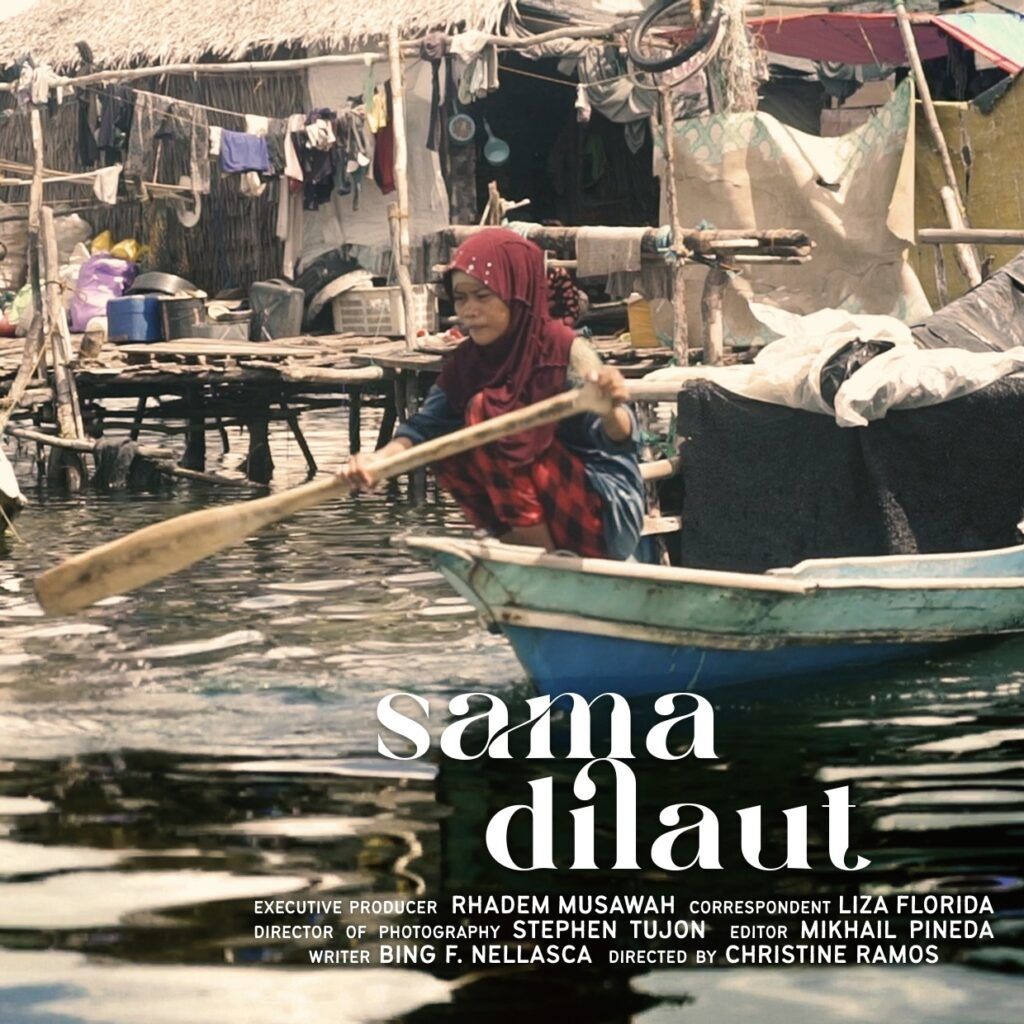
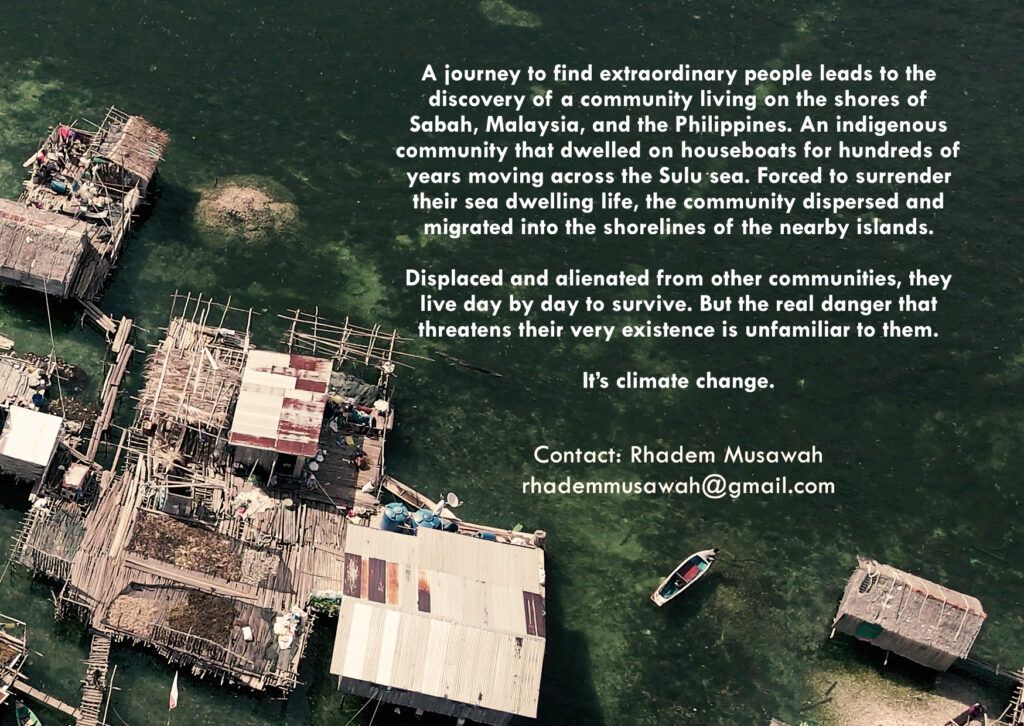
Daniel Ellsberg: In Memoriam
“A nuclear war cannot be won and must never be fought.”
Dan
Words cannot express our sense of loss with the passing of Daniel Ellsberg.
From his earliest work to reduce the possibility of calamitous nuclear war, to his willingness to risk life in prison to end the Vietnam War with the release of the Pentagon Papers, through his steadfast efforts to prevent and halt wars and to win a nuclear weapons-free world, we owe Dan the greatest gratitude.
A man of genius, passionate and inspiring commitments to justice, peace, and human survival.
To his last, an indefectible advocate, mentor, partner, and inspiring friend.
We grieve the loss of Dan and redouble our commitments to following his inspired path.
We will always remember your commitment to peace and nuclear disarmament. Your IPB family is grateful for all your contributions and time we spent especially during the Two Minutes to Midnight – How do we move from geopolitical conflict to nuclear abolition? last 2018.
Daniel Ellsberg Presente!
In loving memory of Dan, we are sharing his message to us, and to future generations
Statements on the G7 Hiroshima Summit 2023
Major economies gathered for the G7 Summit Meeting in Hiroshima, Japan, from May 19 to May 21, 2023. The G7 leaders reaffirmed their support for the Treaty on the Non-Proliferation of Nuclear Weapons and their commitment to nuclear disarmament and non-proliferation initiatives. But what’s the real deal?
Campaign for Nuclear Disarmament, Kate Hudson, and the Japan Council against Atomic and Hydrogen Bombs (Gensuikyo), Yasui Masakazu, issued their perspectives on the G7’s meeting and the current state of nuclear disarmament that we are in now. Their insights will give us the other side of the coin and a closer look at the nuclear issue that we are all facing.
Together, we call for a nuclear-free world—the genuine one.
1. Gensuikyo: Statement on the G7 Hiroshima Summit
We Protest against G7 Leaders for Turning their Backs on the Call of the Hibakusha and the PeopleSeeking the Prohibition and Abolition of Nuclear Weapons
By: Yasui Masakazu, Japan Council against Atomic and Hydrogen Bombs (Gensuikyo) on May 21, 2023
2. G7 hypocrisy in Hiroshima
By: Kate Hudson, Campaign for Nuclear Disarmament on May 30, 2023
EBCO Annual Report on Conscientious Objection to Military Service in Europe 2022/23
Press Release posted on 12th May, 2023
➡️ Original post here: EBCO ANNUAL REPORT ON CONSCIENTIOUS OBJECTION
The European Bureau for Conscientious Objection published its Annual Report on Conscientious Objection to Military Service in Europe 2022/23, covering the region of Council of Europe (CoE) as well as Russia (former CoE member state) and Belarus (candidate CoE member state).
Overall, the human right to conscientious objection to military service was higher in the European agenda in 2022, as a result of the ongoing Russian war of aggression against Ukraine and the courageous conscientious objectors and pacifists.
The continuation of the war itself constitutes a tragic failure of diplomacy and politicians, as well as a bloody victory of militarism and war profiteers. The military mobilisation and the prosecution of those who object the war constitutes a blatant violation of their fundamental human rights, as well as the indiscriminate European sanctions against all Russians, instead of granting Visas (type C and D) at least to those who object the war.
(EBCO’s President Alexia Tsouni)
Hopefully, remarkable efforts have been made, and more and more inspiring voices are calling for peace (voices for peace from civil society worldwide), including in the framework of the international #ObjectWarCampaign (Russia, Belarus, Ukraine: Protection and asylum for deserters and conscientious objectors to military service), jointly launched by the European Bureau for Conscientious Objection (EBCO), the International Fellowship of Reconciliation (IFOR), War Resisters’ International (WRI), and Connection e.V..
#ObjectWarCampaign
#StandWithObjectors
Contact and interview requests:
Alexia Tsouni, EBCO President +30 6974461210, tsounialexia@gmail.com (English)
Sam Biesemans EBCO, +32477268893, ebco.brussels@skynet.be, www.ebco-beoc.org (French, Dutch, Italian, English)
The INTERNATIONAL PEACE BUREAU wants to share this report, as those who refuse to kill and refuse to take part in violent means of conflict resolution are also contributing to peace.
90 Seconds to Midnight: A Wake-Up Call for Peace?
Official Statement – 25/01/2023
On 24 January 2023, The Bulletin of the Atomic Scientists officially announced that the Doomsday Clock moved to 90 seconds to midnight – the closest the count has been to global apocalypse in its 78 years of existence, underlining the grim state of the world in 2023.
This report is a wake-up call to the world; we cannot continue on the path that we have been going. The International Peace Bureau and our global network once again call on all parties involved in the war in Ukraine – including those indirectly involved through weapons transfers and other support – to push for an immediate ceasefire and take good-faith efforts to return to the negotiating table, in order to avoid the unprecedented threats that the war poses for the future of all life on our planet.
The Bulletin references the dangers of escalation in the war in Ukraine – where both parties are entrenched in their positions and Russia has threatened the use of nuclear weapons – alongside the weaponization of nuclear plants, the lack of cooperation on climate change, and the erosion of international norms.
While the war in Ukraine may be the most immediate existential threat we face, the end of the war itself is not enough to push us back from the brink. We urgently need Common Security, including a new peace architecture in Europe to avoid future conflicts. Furthermore, we need global cooperation to eliminate nuclear weapons through the framework of the Treaty on the Prohibition of Nuclear Weapons (TPNW) and the Nuclear Non-Proliferation Treaty (NPT). New agreements between nuclear weapons states on reductions of such weapons, an end to their modernization and the nuclear sharing between the US and European countries, and the expansion of Nuclear Weapons Free Zones (NWFZ) could be a starting point toward their elimination.
Importantly, the “Joint Statement of the Leaders of the Five Nuclear-Weapon States” just over a year ago emphasized that a nuclear war can never be won.
Finally, we need urgent global cooperation to reduce greenhouse gas emissions and transition to clean energy; we need to cease the alarming use of new militarized like drones and artificial intelligence; and we need global justice, standing together against colonialism, militarism, inequality, and exploitation, to avoid the conflicts of tomorrow. A negation of militarism and a reduction of military spending – which globally amounts to more than 2 trillion US dollars – in favour of social spending can ensure that we avoid moving any closer to global catastrophe.
The International Peace Bureau will continue to work with our network and partners to push us back from the brink and create a brighter, peaceful future.
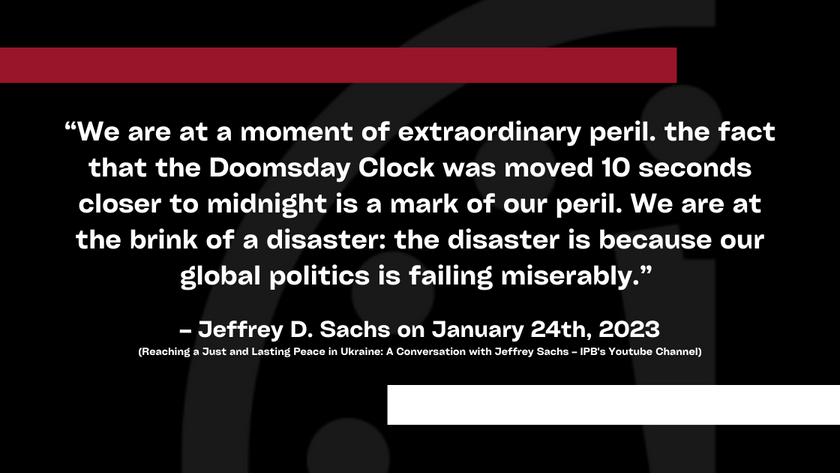
You can download the PDF version of this official statement here:
➡️ Interact with us on social media especially to learn about our latest actions and activities: Facebook, Twitter, Instagram, and Youtube.
➡️ Our office is open to reply to any doubts regarding the documents that were above presented. To get in touch with us, e-mail us at info@ipb-office.berlin.
Itsunori Onodera at the Stimson Center
On January 11 2023, Japan’s former Defense Minister Itsunori Onodera spoke at the Stimson Center followed by a Q&A. IPB’s former vice-president, Joseph Gerson presents a summary of the session with Itsunori Onodera.

